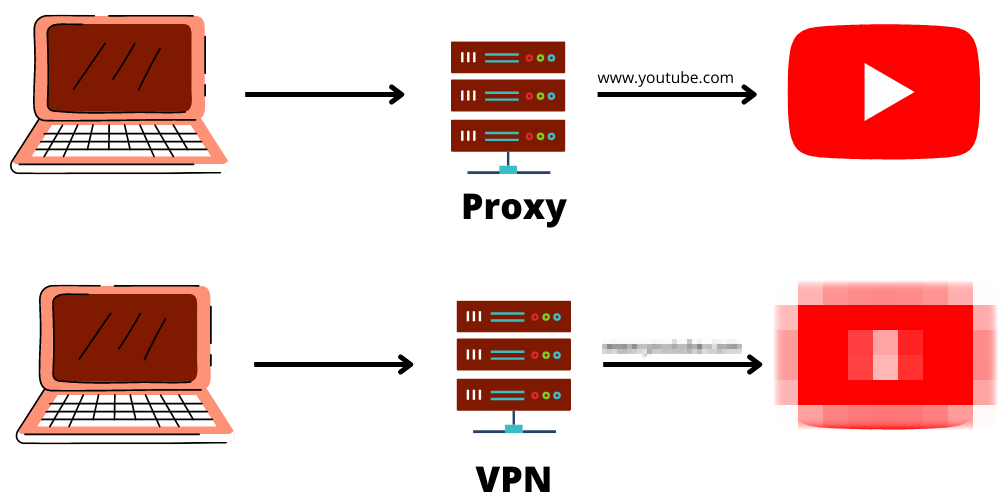They work same on many fronts but have significant points of difference. Let’s settle this out: Proxy vs VPN, once and for all.
The primary motive is to hide the IP address. Proxy and VPN both do this but in quite different ways. In addition, there is an abundance of free proxy and VPN servers which are dangerous, barring a few exceptions.
But it all depends on what’s your use case.
Let’s start it with…
What is a Proxy?
The dictionary meaning of ‘Proxy’ which best suits here is ‘Representative’. So, internet proxies are your representatives to the online world. They do nothing more, nothing less.
When connected via a proxy server, you are known by the proxy IP address and not yours. So a proxy server is just a middleman between you and the actual web server.
However, they act only on the application level and don’t cover all connections going through that operating system. Certain applications (like BitTorrent) have this configuration in their settings which allows using a proxy server. Still, a few applications (like the Brave Browser) don’t have this attribute and use the proxy set up in the operating system instead.
The important thing is proxies don’t encrypt data and require manual setup.
What is a VPN?
A virtual private network conceals your network traffic from your ISP, governments, cybercriminals, etc. They encrypt your data, and you don’t need to configure them for each application.
They also provide you with an anonymous IP address. But since the major use case is for privacy, you get multi-layer encryption resulting in speeds that are considerably slower than using a proxy.
Owing to the greater protection, they are comparatively pricier.
However, free providers exist for both, from which a privacy-concerned user should steer clear of.
Proxy vs VPN
Let’s summarize Proxy vs VPN with this table:
| Proxy | VPN |
| Conceals IP address. | Conceals IP address and Encrypts the data. |
| Works for the configured application. | Works for a complete operating system with allowable exceptions. |
| Have faster network speeds. | Lesser speeds due to encryption. |
| Unblocks geo-restricted content. | Unblocks geo-restricted content and protects from network snooping. |
| More free options and paid ones are cheap. | Less free options and paid ones are expensive. |
| The best use case is anonymous browsing and entertainment. | The best use case is privacy-sensitive tasks. |
| ex. KProxy | ex. Proton VPN, AdGuard VPN, OperaVPN |
Simply put, a VPN is a proxy that encrypts the data. In addition, a VPN is packed with additional features like double VPN, split tunnelling, Tor over VPN, etc., which makes it ideal for a greater level of anonymity.

And this is the perfect opportunity to know about the…
Dangers of Free Proxies/VPNs
If the service is free, you might be the product. I doubt this fits anywhere else as good as it with free VPNs and proxies. The first and most common risk is with data that’s shared with 3rd-party advertisers.
And the more grave danger is getting injected with malware while connecting to suspicious networks.
Moreover, some of the free services make the users share their IP addresses within the network without their consent. This means that you act as a proxy for a different user using the same proxy service. And similarly, that user might be acting the same for others.

One more disadvantage can be sharing your network resources with paid users. This translates to agreeing with anyone in that specific network to use your assets for whatever purpose they wish to.
And if by any chance, you find a genuinely free VPN/proxy–chances are they will be overwhelmed with users at all times. In the end, the performance (read speed) you get out of them will hardly be satisfactory.
Not All Paid Services Are Secure!
Even the most advanced of paid VPNs cannot guarantee 100% protection, and the ‘no-logs policy’ is sometimes nothing more than a marketing gimmick.
Because there have been instances of criminals using a VPN for their illicit motives only to be tracked and put behind the bars.
This was the exact same case with Ryan Lin, who was arrested by the FBI with the help of wholehearted cooperation by PureVPN. While Ryan was a cyberstalker and the situation asked for justice, this case is also an unfortunate example of a VPN company violating users’ trust and relinquishing privacy obligations.
Conclusion
Finally, proxy and VPN both have their own advantages and takers. Still, VPNs offer a greater degree of anonymity but at the cost of reduced network speeds.
And whereas a proxy works for a specific application, VPNs are applicable to the whole of the operating system, with the added flexibility to work for just a few applications via features like split tunnelling.
Interested in VPNs? Check out if VPNs are worth it and decide for yourself.
